萧伯纳简介.ppt
萧伯纳简介

萧伯纳
萧伯纳(George Bernard Shaw,1856年7月26日—1950年11月2日),爱尔兰剧作家。
1925年因作品具有理想主义和人道主义而获诺贝尔文学奖,他是英国现代杰出的现实主义戏剧作家,是世界著名的擅长幽默与讽刺的语言大师,同时他还是积极的社会活动家和费边社会主义的宣传者。
他支持妇女的权利,呼吁选举制度的根本变革,倡导收入平等,主张废除私有财产。
萧伯纳的一生,是和社会主义运动发生密切关系的一生。
他认真研读过《资本论》,公开声言他“是一个普通的无产者”,“一个社会主义者”。
他主张艺术应当反映迫切的社会问题,反对“为艺术而艺术”。
其思想深受德国哲学家叔本华及尼采的影响,而他又读过马克思的著作,不过他却主张用渐进的方法改变资本主义制度,反对暴力革命。
萧伯纳英文简介ppt
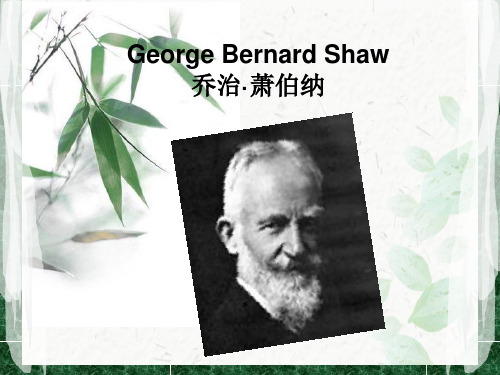
“I say an ordinary London girl out of the gutter and taught to spane.”(discriminational)
In a word,Higgins comes off much worse because of the fact that he has had all the civilizing benefits of wealth and education yet he is rude to the point of being boorish(粗野的) and ill-mannered.
• Henry Higgins(a linguist in the drama)
• He is portrayed as being highly educated,but he is ill-mannered.
• “No,I don’t,who the devil are you?”P143(impolite)
“I have done my best;but nothing can make me the same as these people.”(She is wearing a mask of gentility that imperfactly hides her lower class affiliation)
Shaw demonstrates that only fine clothes and the right accent are not sufficient to make a lady.
The interior beauty such as selfrespect,self-awareness and couteousness is far more important than exterior beauty like clothes,appearance and wealth to make a fair lady or a gentleman.
高中英语 Unit4《Pygmalion》-Reading

Eliza
Low class
Professor Higgins
Upper class
Colonel Pickering
Fast reading
when 11:15,PM in 1914 where who London, England
Eliza, Professor Higgins, Colonel Pickering fateful meetings
• 中文名:萧伯纳 • 英文名: George Bernard Shaw • 别名:乔治· 伯纳· 萧 • 性别:男 • 国籍:英国 • 出生年月:1856年7月26日 去世年月:1950年11月2日 • 职业:文学评论家 剧作家 • 重要事件:1925年获诺贝尔 文学奖。 代表作品:《华伦夫人的职 业》 、《卖花女》
Skimming
1 2 3
What are the main characters of this act?
What do they do respec -tively?
What are they doing at the beginning of the play?
Tip: Some information is included in the stage directions, like the character, time, place, weather, lighting, etc.
people tend to behave as you expect they will. If you expect a person to take responsibility, they probably will. If you expect them not to even try, they probably won’t.
苏教版语文三年级下册课文涉及的知名作者和知名人物简介

1、桑兰(《微笑着承受一切》)
桑兰(1981—),浙江宁波人,原中国女子体操队队员,1997年获得全国跳马冠军,1998年7月22日,桑兰在第四届美国友好运动会的一次跳马练习中不慎受伤,造成颈椎骨折,胸部以下高位截瘫,成为各方关注的焦点。其表现出顽强意志,在北京大学新闻系毕业,并成为2008年北京申奥大使之一,又于2008年北京奥运官方网站担当特约记者。
叶圣陶(1894-1988),原名叶绍钧,江苏苏州人,著名作家、教育家、编辑家、文学出版家和社会活动家。解放后,叶圣陶曾担任出版总署副署长、人民教育出版社社长、教育部副部长、民进中央主席。
8、李白(《望庐山瀑布》)(见一年级上册博文)
9、杜甫(《绝句》)
杜甫(公元712—公元770),河南巩县(今巩义市)人。字子美,自号少陵野老,杜少陵,杜工部等,盛唐大诗人,世称“诗圣”,现实主义诗人,世称杜工部、杜拾遗,代表作“三吏”(《新安吏》《石壕吏》《潼关吏》)“三别”(《新婚别》《垂老别》《无家别》)。原籍湖北襄阳,生于河南巩县。初唐诗人杜审言之孙。他忧国忧民,人格高尚,一生写诗1500多首,诗艺精湛,被后世尊称为“诗圣”。
6、萧伯纳(《大作家的小老师》)
萧伯纳(George Bernard Shaw,1856-1950),直译为乔治·伯纳·萧,爱尔兰剧作家,1925年获诺贝尔文学奖,是英国现代杰出的现实主义戏剧作家,是世界著名的擅长幽默与讽刺的语言大师。萧伯纳的一生,是和社会主义运动发生密切关系的一生。
7、叶圣陶(《荷花》)
4、卢纶(《李广射虎》)
卢纶(约737-约799),唐代诗人,大历十才子之一,河中蒲(今山西省永济县)人。有《卢户部诗集》。
5、王勃(《少年王勃》)
萧伯纳是谁?爱尔兰剧作家萧伯纳生平简介
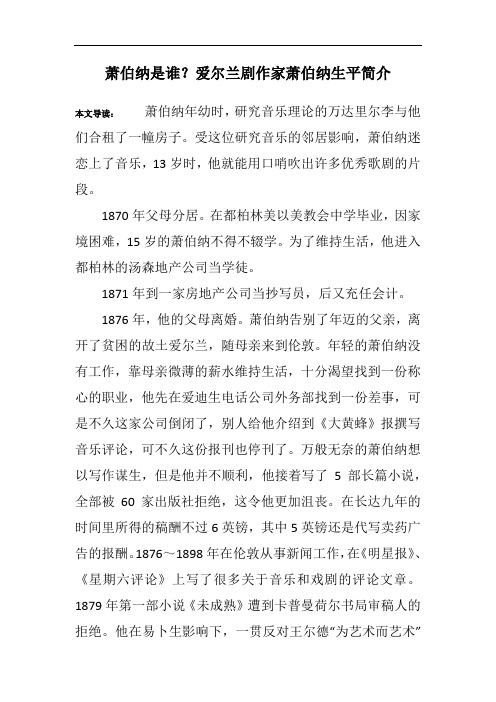
萧伯纳是谁?爱尔兰剧作家萧伯纳生平简介本文导读:萧伯纳年幼时,研究音乐理论的万达里尔李与他们合租了一幢房子。
受这位研究音乐的邻居影响,萧伯纳迷恋上了音乐,13岁时,他就能用口哨吹出许多优秀歌剧的片段。
1870年父母分居。
在都柏林美以美教会中学毕业,因家境困难,15岁的萧伯纳不得不辍学。
为了维持生活,他进入都柏林的汤森地产公司当学徒。
1871年到一家房地产公司当抄写员,后又充任会计。
1876年,他的父母离婚。
萧伯纳告别了年迈的父亲,离开了贫困的故土爱尔兰,随母亲来到伦敦。
年轻的萧伯纳没有工作,靠母亲微薄的薪水维持生活,十分渴望找到一份称心的职业,他先在爱迪生电话公司外务部找到一份差事,可是不久这家公司倒闭了,别人给他介绍到《大黄蜂》报撰写音乐评论,可不久这份报刊也停刊了。
万般无奈的萧伯纳想以写作谋生,但是他并不顺利,他接着写了5部长篇小说,全部被60家出版社拒绝,这令他更加沮丧。
在长达九年的时间里所得的稿酬不过6英镑,其中5英镑还是代写卖药广告的报酬。
1876~1898年在伦敦从事新闻工作,在《明星报》、《星期六评论》上写了很多关于音乐和戏剧的评论文章。
1879年第一部小说《未成熟》遭到卡普曼荷尔书局审稿人的拒绝。
他在易卜生影响下,一贯反对王尔德“为艺术而艺术”的观点,大力倡导和创作以讨论社会问题为主旨的“新戏剧”。
1884年9月,他听了美国《进步和贫困》一书作者亨利·乔治的演讲,受到启发,从此开始注意研究社会经济问题,并阅读马克思的《资本论》。
1884年改良主义的费边社成立,萧伯纳参加该社,并成为该组织者之一。
发表长篇小说《业余社会主义者》,尖锐地批判了资本主义。
19世纪的英国戏剧一蹶不振,萧伯纳嘲笑它们是迎合低级趣味的“糖果店”,他认为戏剧应该依赖对立思想的冲突和不同意见的辩论来展开。
不过,当他听了评剧家朗诵了易卜生的剧本《培尔·金特》后,感受到“一刹那间,这位伟大诗人的魔力打开了我的眼睛。
历史趣谈:萧伯纳的第一部小说?萧伯纳的经典幽默简介

如对您有帮助,可购买打赏,谢谢萧伯纳的第一部小说?萧伯纳的经典幽默简介导语:萧伯纳是一个有着幽默细胞的戏剧作家,在他的一生当中,有着不多的经典幽默。
那么萧伯纳经典幽默都有哪一些呢?萧伯纳经典幽默有很多,诸如萧伯纳是一个有着幽默细胞的戏剧作家,在他的一生当中,有着不多的经典幽默。
那么萧伯纳经典幽默都有哪一些呢?萧伯纳经典幽默有很多,诸如“不值一块钱”、“夫人问年龄”、“外貌和智慧”等等。
“不值一块钱”是这样的:有一次,萧伯纳正坐在沙发上沉思的时候,坐在他旁边的美国金融家便对他说:“萧伯纳先生,如果您让我知道您正在思考什么的话,我愿意给您一美元。
”“啊,我的思考一美元也不值,”萧伯纳回答道,“我所思考的正是您!”也就是说在他看来这位美国的金融学家一美元都不值。
“夫人问年龄”是这样的:一位年过半百的贵妇问萧伯纳:“您看我有多大年纪?”“看您晶莹的牙齿,像18岁;看您蓬松的卷发,有19岁;看您扭捏的腰肢,顶多14岁。
”萧伯纳一本正经他说。
贵妇人高兴得跳了起来:“您能否准确他说出我的年龄?”“请把我刚才说的三个数字加起来!”萧伯纳的回答先是让这位贵妇开心的不能自已,又让她白开心一场。
“外貌和智慧”是这样的:有一位著名女舞蹈家给萧伯纳写了一封热情洋溢的信,她在信中建议道:如果让他俩结婚,那将对后代和优生学都是件好事。
她着重指出:“将来,生个孩子有你那样的智慧和我这样的外貌,该有多么美妙!”之后,萧伯纳在回信中表示不能接受她的这番好意,他说:“那个孩子如果只有我这样的外貌和你那样的智慧,就槽透了。
他贬低了自己的外貌也贬低了对方的智商。
在萧伯纳的一生当中,有着很多的作品。
作为英国现代杰出的现实主义剧作家的萧伯纳的作品都有哪些呢?1879年的时候,萧伯纳完成了他的第一部小说《未成熟》,但是却被拒绝出版。
1884年,萧伯纳发生活常识分享。
名人简介

姓名、任职期、任职时的总统亚历山大·汉密尔顿 1789年09月11日 1795年01月31日乔治·华盛顿奥立弗·沃尔科特 1795年02月03日 1800年12月31日乔治·华盛顿, 约翰·亚当斯塞缪尔·德克斯特 1801年01月01日 1801年05月13日约翰·亚当斯, 托马斯·杰斐逊艾伯特·加勒廷 1801年05月14日 1814年02月08日托马斯·杰斐逊, 詹姆斯·麦迪逊乔治·坎贝尔 1814年02月09日 1814年10月05日詹姆斯·麦迪逊亚历山大·詹姆斯·达拉斯 1814年10月06日 1816年10月21日詹姆斯·麦迪逊威廉·哈里斯·克劳福德 1816年10月22日 1825年03月06日詹姆斯·麦迪逊, 詹姆斯·门罗理查德·拉什 1825年03月07日 1829年03月05日约翰·昆西·亚当斯塞缪尔·德卢森纳·英厄姆 1829年03月06日 1831年06月20日安德鲁·杰克逊路易斯·麦克莱恩 1831年08月08日 1833年05月28日安德鲁·杰克逊威廉·约翰·杜安 1833年05月29日 1833年09月22日安德鲁·杰克逊罗杰·布鲁克·托尼 1833年09月23日 1834年06月25日安德鲁·杰克逊利瓦伊·伍德伯里 1834年07月01日 1841年03月03日安德鲁·杰克逊, 马丁·范布伦托马斯·尤因 1841年03月04日 1841年09月11日威廉·亨利·哈里森, 约翰·泰勒沃尔特·福沃德 1841年09月13日 1843年03月01日约翰·泰勒约翰·斯宾塞 1843年03月08日 1844年05月02日约翰·泰勒乔治·莫蒂默·比布 1844年07月04日 1845年03月07日约翰·泰勒罗伯特·约翰·沃克 1845年03月08日 1849年03月05日詹姆斯·诺克斯·波尔克威廉·莫里斯·梅雷迪斯 1849年03月08日 1850年07月22日扎卡里·泰勒托马斯·科温 1850年07月23日 1853年03月06日米勒德·菲尔莫尔詹姆斯·格思里 1853年03月07日 1857年03月06日福兰克林·皮尔斯豪厄尔·科布 1857年03月07日 1860年12月08日詹姆斯·布坎南菲利普·弗朗西斯·托马斯 1860年12月12日 1861年01月14日詹姆斯·布坎南约翰·亚当斯·迪克斯 1861年01月15日 1861年03月06日詹姆斯·布坎南萨尔蒙·波特兰·查斯 1861年03月07日 1864年06月30日亚伯拉罕·林肯威廉·皮特·费森登 1864年07月05日 1865年03月03日亚伯拉罕·林肯休·麦卡洛克 1865年03月09日 1869年03月03日亚伯拉罕·林肯, 安德鲁·约翰逊乔治·休厄尔·鲍特韦尔 1869年03月12日 1873年03月16日尤里西斯·辛普森·格兰特威廉·亚当斯·理查森 1873年03月17日 1874年06月03日尤里西斯·辛普森·格兰特本杰明·布里斯托 1874年06月04日 1876年06月20日尤里西斯·辛普森·格兰特洛特·迈里克·莫里尔 1876年07月07日 1877年03月09日尤里西斯·辛普森·格兰特, 拉瑟福德·B·海斯约翰·舍曼 1877年03月10日 1881年03月03日拉瑟福德·B·海斯威廉·温德姆 1881年03月08日 1881年11月13日詹姆斯·加菲尔德, 切斯特·A·阿瑟查尔斯·詹姆斯·福尔杰 1881年11月14日 1884年09月04日切斯特·A·阿瑟沃尔特·昆廷·格雷沙姆 1884年09月05日 1884年10月30日切斯特·A·阿瑟休·麦卡洛克 1884年10月31日 1885年03月07日切斯特·A·阿瑟, 格罗弗·克利夫兰丹尼尔·曼宁 1885年03月08日 1887年03月31日格罗弗·克利夫兰查尔斯·费尔柴尔德 1887年04月01日 1889年03月06日格罗弗·克利夫兰威廉·温德姆 1889年03月07日 1891年01月29日本杰明·哈里森查尔斯·福斯特 1891年02月25日 1893年03月06日本杰明·哈里森, 格罗弗·克利夫兰约翰·格里芬·卡莱尔 1893年03月07日 1897年03月05日格罗弗·克利夫兰, 威廉·麦金莱赖曼·盖奇 1897年03月06日 1902年01月31日威廉·麦金莱, 西奥多·罗斯福莱斯利·莫迪默·肖 1902年02月01日 1907年03月03日西奥多·罗斯福乔治·布鲁斯·科特柳 1907年03月04日 1909年03月07日西奥多·罗斯福富兰克林·麦克维 1909年03月08日 1913年03月05日威廉·霍华德·塔夫脱威廉·吉布斯·麦卡杜 1913年03月06日 1918年12月15日伍德罗·威尔逊卡特·格拉斯 1918年12月16日 1920年02月01日伍德罗·威尔逊戴维·富兰克林·休斯顿 1920年02月02日 1921年03月03日伍德罗·威尔逊安德鲁·梅隆 1921年03月04日 1932年02月12日沃伦·G·哈定, 卡尔文·柯立芝, 赫伯特·胡佛奥格登·利文斯顿·米尔斯 1932年02月13日 1933年03月04日赫伯特·胡佛威廉·哈特曼·伍丁 1933年03月05日 1933年12月31日富兰克林·德拉诺·罗斯福小亨利·摩根索 1934年01月01日 1945年07月22日富兰克林·德拉诺·罗斯福,哈利·S·杜鲁门弗雷德里克·摩尔·文森 1945年07月23日 1946年06月23日哈利·S·杜鲁门约翰·斯耐德 1946年06月25日 1953年01月20日哈利·S·杜鲁门乔治·汉弗莱 1953年1月21日 1957年7月29日德怀特·D·艾森豪威尔罗伯特·伯纳德·安德森 1957年7月29日 1961年1月20日德怀特·D·艾森豪威尔克拉伦斯·道格拉斯·狄龙 1961年1月21日 1965年4月1日约翰·肯尼迪, 林登·约翰逊亨利·汉密尔·福勒 1965年4月1日 1968年12月20日林登·约翰逊约瑟夫·沃尔克·巴尔 1968年12月21日 1969年1月20日林登·约翰逊戴维·马修·肯尼迪 1969年1月22日 1971年2月10日理查德·尼克松约翰·康纳利 1971年2月11日 1972年6月12日理查德·尼克松乔治·普拉特·舒尔茨 1972年6月12日 1974年5月8日理查德·尼克松威廉·爱德华·西蒙 1974年5月8日 1977年1月20日理查德·尼克松, 杰拉尔德·福特沃纳·迈克尔·布鲁门特尔 1977年1月23日 1979年8月4日吉米·卡特乔治·威廉·米勒 1979年8月7日 1981年1月20日吉米·卡特唐纳德·里根 1981年1月22日 1985年2月1日罗纳德·里根詹姆斯·贝克 1985年2月4日 1988年8月17日罗纳德·里根尼克拉斯·布雷迪 1988年9月15日 1993年1月17日罗纳德·里根, 乔治·H·W·布什劳埃德·米拉德·小·本特森 1993年1月20日 1994年12月22日比尔·克林顿罗伯特·爱德华·鲁宾 1995年1月11日 1999年7月2日比尔·克林顿劳伦斯·萨默斯 1999年7月2日 2001年1月20日比尔·克林顿美国第75任财政部长蒂莫西·盖特纳保罗·亨利·奥尼尔 2001年1月20日 2002年12月31日乔治·W·布什约翰·斯诺 2003年2月3日 2006年6月30日乔治·W·布什亨利·保尔森 2006年7月10日 2009年1月20日乔治·W·布什蒂莫西·盖特纳 2009年1月20日 2013年1月25日贝拉克·奥巴马尼尔·沃林 2013年1月25日 2013年2月28日(代理)贝拉克·奥巴马雅各布·卢 2013年2月28日[1] 现任贝拉克·奥巴马约翰·洛克菲勒约翰·戴维森·洛克菲勒(John Davison Rockefeller)(1839年7月8日–1937年5月23日)美国资本家,也是上世纪第一个亿万富翁,巨蟹座。
George Bernard Shaw 萧伯纳的简介

BY
Contents:
1 Author 2 Author's works 3 Pygmalion 4 Style of Bernard Shaw
PART ONE
George Bernard Shaw(1856-1950)
Birithplace: Dublin, Ireland Occupation:Playwright(剧作家),Critic,
Characteristics of Bernard Shaw's plays
1.Structurally and thematically, Shaw followed the great traditions of realism [’ri:əlɪzəm].(现实主义) 2.To portray[pɔ:’treɪ](描绘)his characters, he employed contrast antithesis [æn’tɪθəsɪs](对立).His characters are the representative of ideas that alter [’ɔ:ltə(r)] (改变)during the play. 3.Much of his drama is constructed by employing inversion.(倒置) 4.The plot of his plays advanced not by action but by dialogues like comedies of manners.(风格手法)
• He contract with the poor people and came to know their miserable life. • He educated himself at the library in British Museum
萧伯纳名言
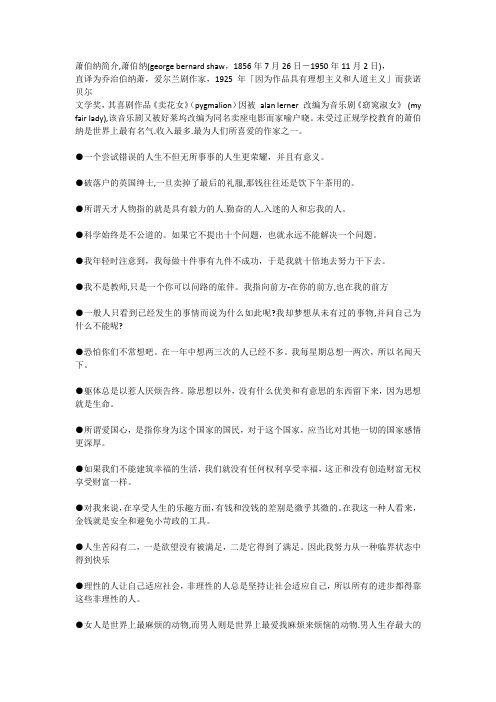
萧伯纳简介,萧伯纳(george bernard shaw,1856年7月26日-1950年11月2日),直译为乔治伯纳萧,爱尔兰剧作家,1925年「因为作品具有理想主义和人道主义」而获诺贝尔文学奖,其喜剧作品《卖花女》(pygmalion)因被alan lerner 改编为音乐剧《窈窕淑女》(my fair lady),该音乐剧又被好莱坞改编为同名卖座电影而家喻户晓。
未受过正规学校教育的萧伯纳是世界上最有名气.收入最多.最为人们所喜爱的作家之一。
●一个尝试错误的人生不但无所事事的人生更荣耀,并且有意义。
●破落户的英国绅士,一旦卖掉了最后的礼服,那钱往往还是饮下午茶用的。
●所谓天才人物指的就是具有毅力的人.勤奋的人.入迷的人和忘我的人。
●科学始终是不公道的。
如果它不提出十个问题,也就永远不能解决一个问题。
●我年轻时注意到,我每做十件事有九件不成功,于是我就十倍地去努力干下去。
●我不是教师,只是一个你可以问路的旅伴。
我指向前方-在你的前方,也在我的前方●一般人只看到已经发生的事情而说为什么如此呢?我却梦想从未有过的事物,并问自己为什么不能呢?●恐怕你们不常想吧。
在一年中想两三次的人已经不多。
我每星期总想一两次,所以名闻天下。
●躯体总是以惹人厌烦告终。
除思想以外,没有什么优美和有意思的东西留下来,因为思想就是生命。
●所谓爱国心,是指你身为这个国家的国民,对于这个国家,应当比对其他一切的国家感情更深厚。
●如果我们不能建筑幸福的生活,我们就没有任何权利享受幸福,这正和没有创造财富无权享受财富一样。
●对我来说,在享受人生的乐趣方面,有钱和没钱的差别是微乎其微的。
在我这一种人看来,金钱就是安全和避免小苛政的工具。
●人生苦闷有二,一是欲望没有被满足,二是它得到了满足。
因此我努力从一种临界状态中得到快乐●理性的人让自己适应社会,非理性的人总是坚持让社会适应自己,所以所有的进步都得靠这些非理性的人。
●女人是世界上最麻烦的动物,而男人则是世界上最爱找麻烦来烦恼的动物.男人生存最大的快乐是满足女人的自尊心,而女人生存最大的快乐则是伤害男人的自尊心:就这样子●人生不是一支短短的蜡烛,而是我们暂时拿着的火炬,我们一定要把它燃得十分光明灿烂,然后交给下一代人们●你有一个苹果,我有一个苹果,我们交换一下,一人还是一个苹果;你有一个思想,我有一个思想,我们交换一下,一人就有两个思想。
高二语文统编版选择性必修中册第四《玩偶之家节选》课件优质版

()
A.﹒诽﹒谤(fěi bànɡ) 抱﹒钥﹒匙(yuè chī) ﹒埋(mán)怨
﹒涌(yǒnɡ)现
C.﹒饶(ráo)恕
﹒怯﹒懦(qiè nuò) ﹒撰(zhuàn)写
D.赌﹒咒(zhòu)
拘﹒束(shù)
﹒侮(wǔ)辱
【解析】选B。B项,“钥匙”应读yào shi。
2.下列词语中,没有错别字的一项是 ( )
A.谜人 兴致 避开 灰复 静悄悄
B.披肩
娇嫩
活泼
慌唐 香槟酒
C.安眠
名片
寂寞
厮掉 泥娃娃
D.疑惑
挽救
遮盖
好歹 责任心
【解析】选D。A项,谜—迷,灰—恢;B项,慌—荒;C项,厮—撕。
3.选词填空或判断词语运用正误。
(1)闫丽的妈妈每天出门前,都要精心_化__妆__一番。
【要点识记】 一、字音识记
啰﹒唆(suo) ﹒还(huán)账 ﹒攒(zǎn)着
﹒滋(zī)味 新﹒奇(qí) ﹒暂(zàn)且
按﹒捺(nà) 雪﹒茄(jiā) ﹒撇(piē)开
﹒噩(è)梦 ﹒塌(tā)天 市﹒侩(kuài) 狭﹒隘(ài)
赌﹒咒(zhòu)
拘﹒束(shù)
﹒奇(qí)迹
﹒陌(mò)生
①按容量大小,戏剧文学可分为多幕剧、独幕剧和小品; ②按表现形式,可分为话剧、歌剧、诗剧、舞剧、戏曲等; ③按题材,可分为神话剧、历史剧、传奇剧、市民剧、社会剧、家庭剧、 科学幻想剧等; ④按戏剧冲突的性质及效果,可分为悲剧、喜剧和正剧。 最基本、使用最多的分类是悲剧、喜剧和正剧,正剧也称为悲喜剧。
他将戏剧当作表现当代社会生活的镜子,把舞台当作讨论当代政治问题的论坛。
C.这部分文字是娜拉对海尔茂提出的独立宣言,表现了娜拉的反叛精神,是对当 时的拜金主义、不平等现实的深刻而具体的揭露。 D.舞台说明“穿外套”“戴帽子”“围披肩”“拿起手提包”来表现娜拉的动 作,表示与海尔茂交谈过程中,一直在做出走的准备,说明出走决心坚定。 【解析】选A。“这是艺术上的失败”有误,剧中讨论社会与人生的大问题,是社 会问题剧的特色,也是易卜生的独特之处。
萧伯纳
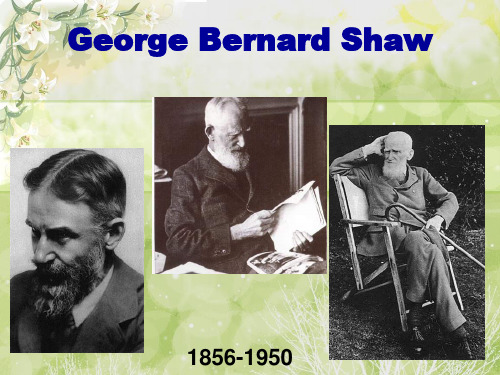
《华伦夫人的职业》
《华伦夫人的职业》(1894年)取材于 现实生活。出身贫苦,在操了皮肉生涯之 后,由于经营有道,发展成为欧洲多个大 妓院的老板。为了不让女儿薇薇重蹈覆辙 ,她以嫖资供女儿接受高等教育。当薇薇 最终了解到母亲的苦难经历后,她谅解了 母亲的过去,但还是在经济上和母亲决裂 ,决心依靠自己的劳动独立生活。本剧描 述了主人公人生哲学的形成和性格发展的 全过程。
《皮格马利翁》
《皮格马利翁》(1912年)是剧作家的一 部最著名的喜剧作品。在此之前,作者已经创 作并上演了二十八个剧本,虽然在戏剧界引起 了广泛的重视,但却没有在观众中广为流行。 直到这部喜剧上演,并被拍成电影、上了广播 ,他才真正作为喜剧大师赢得了观众的普遍接 受与欢迎。“匹克梅梁”即希腊神话中塞浦路 斯王皮格马利翁,善雕刻,一次他雕刻了一个 少女像,并且爱恋上了这个雕像,爱神受到感 动,便给了雕像以生命,使他们二人结为夫妇 。剧作家借用这个名字和典故以表示剧中语音 学家息金斯和卖花女伊莉莎的关系。
这个曾饱受苦难的原本正直的女人,目 睹无数从事诚实劳动的妇女濒于死亡或过 着牛马不如的生活,便对正直而遭受苦难 是否值得产生了怀疑。她的职业虽然卑鄙 下贱,但却给她带来了财富和体面,因而 她从不想放弃这种职业。她认为除了罪恶 的行当外,没有别的什么可干,她要靠它 发财,她要遵循这个世界的规律并从中取 利。剧作者以主人公的尖锐台词透视出当 代社会中人与人之间真正关系的内幕。
Major Works
• Widowers' Houses (1892) 《鳏夫的房产》 • Mrs. Warren‘s Profession (1894)《华伦夫人的职业》 Caesar and Cleopatra (1898)《凯萨与克丽奥佩拉 》 Man and Superman (1903)《人与超人》 Major Barbara (1905) 《巴巴拉少校》 Pygmalion (1912) 《卖花女》 Heartbreak House (1917) 《伤心之家》 Saint Joan (1923) 《圣女贞德》 The Apple Cart (1929) 《苹果车》
Oscar Wilde简介

• 1897年获释后,王尔德立刻动身前往巴黎,对 年获释后,王尔德立刻动身前往巴黎, 年获释后 于英国他失望透顶,不再有丝毫留恋。 于英国他失望透顶,不再有丝毫留恋。其后他为 了两名孩子曾尝试与康斯坦斯复合, 了两名孩子曾尝试与康斯坦斯复合,但阿尔弗莱 德亦同时表示想与王尔德重归如好,最后王尔德 德亦同时表示想与王尔德重归如好, 放弃两名孩子而选择了阿尔弗莱德。 放弃两名孩子而选择了阿尔弗莱德。王尔德在以 化名居住法国期间完成并出版了《 化名居住法国期间完成并出版了《瑞丁监狱之 之后与阿尔弗莱德同游意大利。 歌》,之后与阿尔弗莱德同游意大利。但几个月 两人再次分手。 后,两人再次分手。 1900年王尔德终于在好 年王尔德终于在好 友罗伯特. 罗比” 罗斯 罗斯( 友罗伯特.“罗比”·罗斯(Robert ‘Robbie’ Ross)帮助下改信天主教。同年 月30日因病 )帮助下改信天主教。同年11月 日 于巴黎的阿尔萨斯旅馆去世,终年46岁 于巴黎的阿尔萨斯旅馆去世,终年 岁,死时只 有罗比与另一朋友陪伴。他在巴黎的墓地, 有罗比与另一朋友陪伴。他在巴黎的墓地,按照 他在诗集《斯芬克斯》中的意象, 他在诗集《斯芬克斯》中的意象,雕刻成了一座 小小的狮身人面像。 小小的狮身人面像。
Life
Works
• Oscar Fingal O'Flahertie Wills Wilde (16 October 1854 – 30 November 1900) was an Irish writer and poet. After writing in different forms throughout the 1880s, he became one of London's most popular playwrights in the early 1890s. Today he is remembered for his epigrams, plays and the circumstances of his imprisonment, followed by his early death.
George Bernard Shaw简介
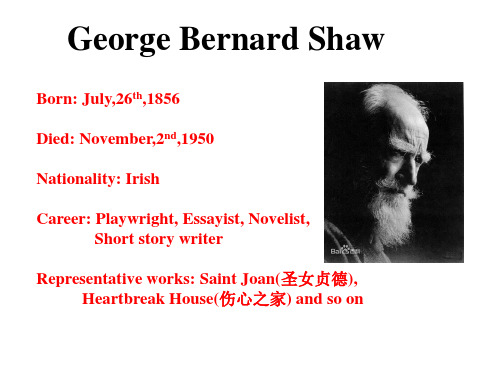
• style • (1)Shaw is a critical realist writer. His plays bitterly criticize and attack English bourgeois society. • (2)His plays deal with contemporary social problems. He portrays his situations frankly and honestly, intending to shock his audiences with a new view of society. • (3)He is a humorist and manages to produce amusing and laughable situations.
• 3.The inversion 倒置of the situation : Much of Shavian 萧伯纳的 drama is constructed around the inversion of a conventional theatrical situation. The inversion is an integral part of an interpretation of life .Inversion is also used in character portrayal to achieve comic effects .
Scene Ⅲ
Points of View —— ACT Ⅰ Fabian Ideas ——ACT Ⅱ Artistic View
Realistic playwright
Against —— “Art for art’ s sake” Condemn —— the “well-made” but cheap, hollow plays Maintain —— Art should serve social purposes by reflecting human life, revealing social contradictions and educating the common people.
萧伯纳的简介 _350字
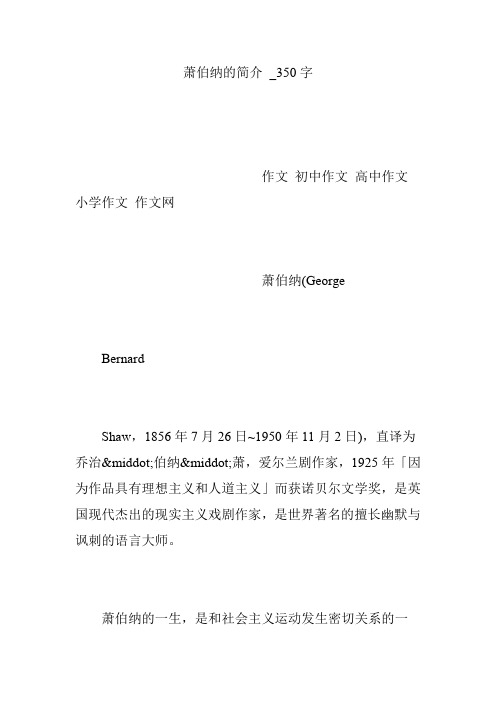
萧伯纳的简介_350字
作文初中作文高中作文小学作文作文网
萧伯纳(George
Bernard
Shaw,1856年7月26日~1950年11月2日),直译为乔治·伯纳·萧,爱尔兰剧作家,1925年「因为作品具有理想主义和人道主义」而获诺贝尔文学奖,是英国现代杰出的现实主义戏剧作家,是世界著名的擅长幽默与讽刺的语言大师。
萧伯纳的一生,是和社会主义运动发生密切关系的一
生,他认真研读过《资本论》,公开声言他“是一个普通的无产者”,“一个社会主义者”。
然而,由于世界观上的局限性,他没能成为无产阶级战士,而终生是一个资产阶级改良主义者。
GeorgeBernardShaw萧伯纳简介

George Bernar d Shaw萧伯纳简介1856-1950 长篇小说:An Unsoci al Social ist业余社会主义者评论:Quinte ssenc e of Ibseni sm 剧本:Widoer’sHouses鳏夫的房产;Mrs Warren’sProfes sion华伦夫人的职业TheDevil’sDiscip le魔鬼的门徒;Man and Superm an人与超人;JohnBull’sOtherIsland英国佬的另一个岛;MajorBarbar a巴巴拉少校;Pygmal ion劈克美梁;Heartb reakHouse伤心之家;The AppleCart 苹果车;Too True to be Good真相毕露born July 26, 1856, Dublin, Irelan ddied Novemb er 2, 1950, Ayot St. Lawren ce, Hertfo rdshi re, Englan dGeorge Bernar d Shaw, photog raphby Yousuf Karsh.Irishcomicdramat ist, litera ry critic, and social ist propag andis t, winner of the NobelPrizefor Litera turein 1925.Earlylife and careerGeorge Bernar d Shaw was the thirdand younge st child(and only son) of George Carr Shaw and Lucind a Elizab eth GurlyShaw. Techni cally, he belong ed to the Protes tant“ascend ancy”—the landed Irishgentry—but his imprac tical father was firsta sinecu red civilservan t and then an unsucc essfu l grainmercha nt, and George Bernar d grew up in an atmosp hereof gentee l povert y, whichto him was more humili ating than beingmerelypoor. At firsttutore d by a cleric al uncle, Shaw basica lly reject ed the school s he then attend ed, and by age 16 he was workin g in a land agent's office.Shaw develo ped a wide knowle dge of music,art, and litera tureas a result of his mother's influe nce and his visits to the Nation al Galler y of Irelan d. In 1872 his mother left her husban d and took her two daught ers to London, follow ing her musicteache r, George John Vandel eur Lee, who from 1866 had shared househ oldsin Dublin with the Shaws. In 1876 Shaw resolv ed to become a writer, and he joined his mother and eldersister (the younge r one having died) in London. Shaw in his 20s suffer ed contin uousfrustr ation and povert y. He depend ed upon his mother's pounda week from her husban d and her earnin gs as a musicteache r. He spenthis aftern oonsin the Britis h Museum readin g room, writin g novels and readin g what he had missed at school, and his evenin gs in search of additi onalself-educat ion in the lectur es and debate s that charac teriz edcontem porar y middle-classLondon intell ectua l activi ties.His fictio n failed utterl y. The semiau tobio graph icaland aptlytitled Immatu rity(1879; publis hed 1930) repell ed everypublis her in London. His next four novels were simila rly refuse d, as were most of the articl es he submit ted to the pressfor a decade. Shaw's initia l litera ry work earned him less than 10 shilli ngs a year. A fragme nt posthu mousl y publis hed as An Unfini shedNovelin 1958 (but writte n 1887–88) was his finalfalsestartin fictio n.Despit e his failur e as a noveli st in the 1880s,Shaw foundhimsel f during this decade. He became a vegeta rian,a social ist, a spellb indin g orator, a polemi cist, and tentat ively a playwr ight. He became the forcebehind the newlyfounde d (1884) Fabian Societ y, a middle-classsocial ist groupthat aimedat the transf ormat ion of Englis h societ y not throug h revolu tionbut throug h “permea tion”(in Sidney Webb's term) of the countr y's intell ectua l and politi cal life. Shaw involv ed himsel f in everyaspecti cs of Britis h of its activi ties,most visibl y as editor of one of the classsocial ism, Fabian Essays in Social ism(1889), to whichhe also contri buted two sectio ns.Eventu ally, in 1885 the dramacritic Willia m Archer foundShaw steady journa listi c work. His earlyjourna lismranged from book review s in the Pall Mall Gazett e (1885–88) and art critic ism in the World(1886–89) to brilli ant musica l column s in the Star(as “Cornodi Basset to”—basset horn) from 1888 to 1890 and in the World(as “G.B.S.”) from 1890 to 1894. Shaw had a good unders tandi ng of music, partic ularl y opera, and he supple mente d his knowle dge with a brilli anceof digres sionthat givesmany of his notice s a perman ent appeal. But Shaw trulybeganto make his markwhen he was recrui ted by FrankHarris to the Saturd ay Review as theatr e critic (1895–98); in that positi on he used all his wit and polemi cal powers in a campai gn to displa ce the artifi ciali tiesand hypocr isies of the Victor ian stagewith a theatr e of vitalideas.He also beganwritin g his own plays.FirstplaysWhen Shaw beganwritin g for the Englis h stage, its most promin ent dramat istswere Sir A.W. Pinero and H.A. Jones. Both men were trying to develo p a modern realis tic drama,but neithe r had the powerto breakaway from the type of artifi cialplotsand conven tiona l charac ter typesexpect ed by theatr egoer s. The povert y of this sort of dramahad become appare nt with the introd uctio n of severa l of Henrik Ibsen's playsonto the London stagearound 1890, when A Doll's Housewas played in London; his Ghosts follow ed in 1891, and the possib ility of a new freedo m and seriou sness on the Englis h stagewas introd uced. Shaw, who was aboutto publis h The Quinte ssenc e of Ibseni sm (1891), rapidl y refurb ished an aborti ve comedy, Widowe rs' Houses, as a play recogn izabl y “Ibseni te” in tone, making it turn on the notori ous scanda l of slum landlo rdism in London. The result (perfor med 1892) floute d the thread bareromant ic conven tions that were stillbeingexploi ted even by the most daring new playwr ights. In the play a well-intent ioned youngEnglis hmanfallsin love and then discov ers that his prospe ctive father-in-law's fortun e and his own privat e income derive from exploi tatio n of the poor.Potent ially this is a tragic situat ion, but Shaw seemsto have been always determ inedto avoidtraged y. The unamia ble lovers do not attrac t sympat hy; it is the social evil and not the romant ic predic ament on whichattent ion is concen trate d, and the action is kept well within the key of ironic comedy.The same dramat ic predis posit ionscontro l Mrs. Warren's Profes sion, writte n in 1893 but not perfor med until1902 becaus e the lord chambe rlain, the censor of plays, refuse d it a licens e. Its subjec t is organi zed prosti tutio n, and its action turnson the discov ery by a well-educat ed youngwomanthat her mother has gradua ted throug h the “profes sion” to become a part-propri etorof brothe ls throug houtEurope. Again, the econom ic determ inant s of the situat ion are emphas ized, and the subjec t is treate d remors eless ly and withou t the titill ation of fashio nable comedi es about“fallen women.” As with many of Shaw's works, the play is, within limits, a dramaof ideas, but the vehicl e by whichtheseare presen ted is essent ially one of high comedy.Shaw called thesefirstplays“unplea sant,” becaus e “theirdramat ic poweris used to forcethe specta tor to face unplea santfacts.” He follow ed them with four “pleasa nt” playsin an effort to find the produc ers and audien ces that his mordan t comedi es had offend ed. Both groups of playswere revise d and publis hed in PlaysPleasa nt and Unplea sant(1898). The firstof the second group,Arms and the Man (perfor med 1894), has a Balkan settin g and makeslighth earte d, though someti mes mordan t, fun of romant ic falsif icati ons of both love and warfar e. The second, Candid a(perfor med 1897), was import ant for Englis h theatr icalhistor y, for its succes sfulproduc tionat the RoyalCourtTheatr e in 1904 encour agedHarley Granvi lle-Barker and J.E. Vedren ne to form a partne rship that result ed in a series of brilli ant produc tions there. The play repres entsits heroin e as forced to choose betwee n her cleric al husban d—a worthy but obtuse Christ ian social ist—and a youngpoet who has fallen wildly in love with her. She choose s herconfid ent-seemin g husban d becaus e she discer ns that he is actual ly the weaker. The poet is immatu re and hyster icalbut, as an artist, has a capaci ty to renoun ce person al happin ess in the intere st of some largecreati ve purpos e. This is a signif icant themefor Shaw; it leadson to that of the confli ct betwee n man as spirit ual creato r and womanas guardi an of the biolog icalcontin uityof the humanrace that is basicto Man and Superm an. In Candid a such specul ative issues are only lightl y touche d on, and this is true also of You NeverCan Tell (perfor med 1899), in whichthe hero and heroin e, who believ e themse lvesto be respec tivel y an accomp lishe d amoris t and an utterl y ration al and emanci pated woman,find themse lvesin the grip of a vitalforcethat takeslittle accoun t of thesenotion s.The strain of writin g theseplays,whilehis critic al and politi cal work went on unabat ed, so sapped Shaw's streng th that a minorillnes s became a majorone. In 1898, during the proces s of recupe ratio n, he marrie d his unoffi cialnurse,Charlo tte Payne-Townsh end, an Irishheires s and friend of Beatri ce and Sidney Webb. The appare ntlyceliba te marria ge lasted all theirlives, Shaw satisf yinghis emotio nal needsin paper-passio n corres ponde nceswith EllenTerry, Mrs. Patric k Campbe ll, and others.Shaw's next collec tionof plays,ThreePlaysfor Purita ns (1901), contin ued what became the tradit ional Shavia n prefac e—an introd uctor y essayin an electr ic prosestyledealin g as much with the themes sugges ted by the playsas the playsthemse lves.The Devil's Discip le (perfor med 1897) is a play set in New Hampsh ire during the Americ an Revolu tionand is an invers ion of tradit ional melodr ama. Caesar and Cleopa tra(perfor med 1901) is Shaw's firstgreatplay. In the play Cleopa tra is a spoile d and viciou s 16-year-old childrather than the 38-year-old temptr ess ofShakes peare's Antony and Cleopa tra. The play depict s Caesar as a lonelys opher as he is a soldie r. The play's and auster e man who is as much a philooutsta nding succes s restsupon its treatm ent of Caesar as a credib le studyin magnan imity and “origin al morali ty” rather than as a superh umanhero on a stagepedest al. The thirdplay, Captai n Brassb ound's Conver sion(perfor med 1900), is a sermon agains t variou s kindsof follymasque radin g as duty and justic e.Intern ation al import anceIn Man and Superm an (perfor med 1905) Shaw expoun ded his philos ophythat humani ty is the latest stagein a purpos efuland eterna l evolut ionar y moveme nt of the “life force” toward ever-higher life forms.The play's hero, Jack Tanner, is bent on pursui ng his own spirit ual develo pment in accord ancewith this philos ophyas he fleesthe determ inedmarita l pursui t of the heroin e, Ann Whitef ield. In the end Jack rueful ly allows himsel f to be captur ed in marria ge by Ann upon recogn izing that she hersel f is a powerf ul instru mentof the “life force,” sincethe contin uatio n and thus the destin y of the humanrace lies ultima telyin her and otherwomen's reprod uctiv e capaci ty. The play's nonrea listi c thirdact, the “Don Juan in Hell” dreamscene,is spoken theatr e at its most operat ic and is oftenperfor med indepe ndent ly as a separa te piece.Shaw had alread y become establ ished as a majorplaywr ighton the Contin ent by the perfor mance of his playsthere, but, curiou sly, his reputa tionlagged in Englan d. It was only with the produc tionof John Bull's OtherIsland(perfor med 1904) in London, with a specia l perfor mance for Edward VII, that Shaw's stagereputa tionwas belate dly made in Englan d.Shaw contin ued, throug h high comedy, to explor e religi ous consci ousne ss and to pointout societ y's compli cityin its own evils.In MajorBarbar a (perfor med 1905), Shaw has his heroin e, a majorin the Salvat ion Army, discov er that her estran ged father, a muniti ons manufa cture r, may be a dealer in deathbut that his princi plesand practi ce, howeve r unorth odox, are religi ous in the highes t sense, whilethoseof the Salvat ion Army requir e the hypocr isies of often-falsepublic confes sionand thedonati ons of the distil lersand the armour ers agains t whichit inveig hs. In The Doctor's Dilemm a(perfor med 1906), Shaw produc ed a satire upon the medica l profes sion(repres entin g the self-protec tionof profes sions in genera l) and upon both the artist ic temper ament and the public's inabil ity to separa te it from the artist's achiev ement. In Androc les and the Lion (perfor med 1912), Shaw dealtwith true and falsereligi ous exalta tionina philos ophic al play aboutearlyChrist ianit y. Its centra l theme,examin ed throug h a groupof earlyChrist ianscondem ned to the arena, is that one must have someth ing worthdyingfor—an end outsid e onesel f—in orderto make life worthliving.Possib ly Shaw's comedi c master piece, and certai nly his funnie st and most popula r play, is Pygmal ion (perfor med 1913). It was claime d by Shaw to be a didact ic dramaaboutphonet ics, and its antihe roichero, HenryHiggin s, is a phonet ician, but the play is a humane comedy aboutlove and the Englis h classsystem. The play is aboutthe traini ng Higgin s givesto a Cockne y flower girl to enable her to pass as a lady and is also about the reperc ussio ns of the experi ment's succes s. The scenein whichElizaDoolit tle appear s in high societ y when she has acquir ed a correc t accent but no notion of polite conver satio n is one of the funnie st in Englis h drama.Pygmal ion has been both filmed (1938), winnin g an Academ y Awardfor Shaw for his screen play,and adapte d into an immens ely popula r musica l, My Fair Lady (1956; motion-pictur e versio n, 1964).WorksafterWorldWar IWorldWar I was a waters hed for Shaw. At firsthe ceased writin g plays, publis hinginstea d a contro versi al pamphl et, “Common SenseAboutthe War,” whichcalled GreatBritai n and its Allies equall y culpab le with the German s and argued for negoti ation and peace. His antiwa r speech es made him notori ous and the target of much critic ism. In Heartb reakHouse(perfor med 1920), Shaw expose d, in a countr y-housesettin g on the eve of war, the spirit ual bankru ptcyof the genera tionrespon sible for the war's bloods hed. Attemp tingto keep from fallin g into “the bottom lesspit of an utterl y discou ragin g pessim ism,” Shaw wrotefive linked playsunderthe collec tivetitleBack to Methus elah(1922). They expoun d hisphilos ophyof creati ve evolut ion in an extend ed dramat ic parabl e that progre ssesthroug h time from the Garden of Eden to AD 31,920.The canoni zatio n of Joan of Arc in 1920 reawak enedwithin Shaw ideasfora chroni cle play abouther. In the result ing master piece, SaintJoan (perfor med 1923), the Maid is treate d not only as a Cathol ic saintand martyr but as a combin ation of practi cal mystic, hereti cal saint, and inspir ed genius. Joan, as the superi or being“crushe d betwee n thosemighty forces, the Church and the Law,” is the person ifica tionof the tragic heroin e; her deathembodi es the parado x that humank ind fears—and oftenkills—its saints and heroes and will go on doingso untilthe very higher moralqualit ies it fearsbecome the genera l condit ion of manthroug h a proces s of evolut ionar y change. Acclai m for SaintJoan led to the awardi ng of the 1925 NobelPrizefor Litera tureto Shaw (he refuse d the award).In his laterplaysShaw intens ified his explor ation s into tragic omicand nonrea listi c symbol ism. For the next five years,he wrotenothin g for the theatr e but worked on his collec ted editio n of 1930–38 and theencycl opaed ic politi cal tract“The Intell igent Woman's GuidetoSocial ism and Capita lism”(1928). Then he produc ed The AppleCart (perfor med 1929), a futuri stichigh comedy that emphas izedShaw's innerconfli cts betwee n his lifeti me of radica l politi cs and his essent ially conser vativ e mistru st of the common man's abilit y to govern himsel f. Shaw's later,minorplaysinclud ed Too True to Be Good(perfor med 1932), On The Rocks(perfor med 1933), The Simple ton of the Unexpe ctedIsles(perfor med 1935), Geneva (perfor med 1938), and In Good King Charle s's Golden Days(1939). Aftera wartim e hiatus, Shaw, then in his 90s, produc ed severa l more plays,includ ing Farfet chedFables(perfor med 1950), Shakes Versus Shav (perfor med 1949), and Why She WouldNot (1956), whichis a fantas y with only flashe s of the earlie r Shaw.Impude nt, irreve rent,and always a showma n, Shaw used his buoyan t wit to keep himsel f in the public eye to the end of his 94 years;his wiry figure, bristl ing beard,and dandyi sh cane were as well-knownthroug houtthe worldas his plays. When his wife, Charlo tte, died of a linger ing illnes s in 1943, in the midstof WorldWar II, Shaw, frailand feelin g the effect s of wartim e privat ions, made perman ent his retrea t from his Londonapartm ent to his countr y home at Ayot St. Lawren ce, a Hertfo rdshi re villag e in whichhe had livedsince1906. He died therein 1950.George Bernar d Shaw was not merely the best comicdramat ist of his time but also one of the most signif icant playwr ights in the Englis h langua ge sincethe 17th centur y. Some of his greate st worksfor the stage—Caesar and Cleopa tra, the “Don Juan in Hell” episod e of Man and Superm an, MajorBarbar a, Heartb reakHouse, and SaintJoan—have a high seriou sness and prosebeauty that were unmatc hed by his stagecontem porar ies. His develo pment of a dramaof moralpassio n and of intell ectua l confli ct and debate, his revivi fying the comedy of manner s, his ventur es into symbol ic farceand into a theatr e of disbel ief helped shapethe theatr e of his time and after. A vision ary and mystic whosephilos ophyof moralpassio n permea tes his plays, Shaw was also the most trench ant pamphl eteer sinceSwift;the most readab le musiccritic in Englis h; the best theatr e criticof his genera tion; a prodig iouslectur er and essayi st on politi cs, econom ics, and sociol ogica l subjec ts; and one of the most prolif ic letter writer s in litera ture. By bringi ng a bold critic al intell igenc e to hismany otherareasof intere st, he helped mold the politi cal, econom ic, and sociol ogica l though t of threegenera tions.Stanle y Weintr aubJo hn I.M. Stewar t Ed.Additi onalReadin gWorksthat are primar ily biogra phy includ e Archib ald Hender son, George Bernar d Shaw, Man of the Centur y (1956, reissu ed in 2 vol., 1972); FrankHarris, Bernar d Shaw (1931); Hesket h Pearso n, Bernar d Shaw (1942, reissu ed 1987; also publis hed as G.B.S., 1942, reissu ed 1952, and as George Bernar d Shaw, 1963); Willia m Irvine, The Univer se of G.B.S. (1949); St. John GreerErvine, Bernar d Shaw (1956); AllanChappe low (ed.), Shaw the Villag er and HumanBeing(1961); B.C. Rosset, Shaw of Dublin: The Format ive Years(1964); J. PercySmith,The Unrepe ntant Pilgri m (1965), a studyof Shaw's twenti es and thirti es; Margot Peters, Bernar d Shaw and the Actres ses (1980); Arnold Silver, Bernar d Shaw: The Darker Side (1982), a psycho logic al study; and Michae l Holroy d, Bernar d Shaw, 4 vol. (1988–92). Earlyworksof critic ism includ e HenryL. Mencke n, George Bernar d Shaw: His Plays(1905, reprin ted 1977); and G.K. Cheste rton, George Bernar d Shaw, new ed. (1935, reissu ed 1961). T.F. Evans(ed.), Shaw: The Critic al Herita ge (1976), collec ts contem porar y critic ism, 1892–1951. Latercritic ism includ es E. Straus s, Bernar d Shaw: Art and Social ism (1942, reprin ted 1978); Eric Bentle y, Bernar d Shaw (1947, reissu ed 1976); AlickWest, George Bernar d Shaw: “A Good Man Fallen AmongFabian s” (1950); Arthur H. Nether cot, Men and Superm en, 2nd ed. (1966), an analys is of Shaw's charac ters; Julian B. Kaye, Bernar d Shaw and the Ninete enth-Centur y Tradit ion (1958); Martin Meisel, Shaw and theNinete enth-Centur y Theate r (1963, reprin ted 1984); Bernar d F. Dukore, Bernar d Shaw, Playwr ight:Aspect s of Shavia n Drama(1973); EldonC. Hill, George Bernar d Shaw (1978), an introd uctor y study;Michae l Holroy d (ed.), The Genius of Shaw: A Sympos ium (1979); Stanle y Weintr aub, The Unexpe ctedShaw: Biogra phica l Approa chesto G.B.S. and His Work (1982); Warren Sylves ter Smith,Bishop of Everyw here: Bernar d Shaw and the Life Force(1982), explor ing aspect s of Shaw's religi osity; A.M. Gibbs,The Art and Mind of Shaw (1983); and Nichol as Grene,Bernar d Shaw, a Critic al View (1984). Curren t critic ism may be foundin the journa l Shaw (annual).。
- 1、下载文档前请自行甄别文档内容的完整性,平台不提供额外的编辑、内容补充、找答案等附加服务。
- 2、"仅部分预览"的文档,不可在线预览部分如存在完整性等问题,可反馈申请退款(可完整预览的文档不适用该条件!)。
- 3、如文档侵犯您的权益,请联系客服反馈,我们会尽快为您处理(人工客服工作时间:9:00-18:30)。
萧伯纳笔下的贞德
• 身着男装
• 有பைடு நூலகம்略,聪明、勇敢
• 天真、鲁莽、固执
• 天才和圣徒就是萧伯纳笔下的贞德的主要性格特征。贞德 既是这样有胆有识,又无视传统和权威,难免要和社会发 生冲突。而那天真无私、不会玩弄权术、也不会保护自己 的特性,也使她难逃一死。在处理贞德之死的情节时,萧 伯纳使贞德的形象有了新的升华,也进一步突出和深化了 “改革家和既得利益集团的冲突” 这一主题。
• 贞德的言行,预示了后来在欧洲产 生的新的信仰原则和新的世俗政权, 也预示了马丁•路德的宗教改革和民族 国家的兴起。这二者正是西欧现代社 会的发端。所以,萧伯纳塑造的贞德, 确实堪称是动摇了中世纪教廷和贵族 封建制的伟大改革先驱。
尾声
贞德死后第二十五年,法庭为她平反昭雪。 四百年后,罗马教廷又封贞德为圣女,还定每年 的五月三十日为贞德举行纪念会。
萧伯纳的创作之路
• 1925年,萧伯纳获得了诺贝尔文学奖。 • 1950年11月2日,萧伯纳在赫特福德郡埃奥特圣劳伦斯寓
所因病逝世,终年94岁。 • 萧伯纳毕生创造幽默,他的墓志铭虽只有一句话,但恰巧
体现了他的风格:“我早就知道无论我活多久,这种事情 迟早总会发生的。”
主要作品
《卡希尔·拜伦的职 业》(Cashel Byron‘s Profession ) 《鳏夫的房产》(Widowers' Houses) 《圣女贞德》(Saint Joan) 历史剧 《卖花女》(Pygmalion)(1964年改编成电影《窈窕淑女》当
• “一个普通的无产者”,“社会主义者”。
萧伯纳的生平及创作之路
• 1856年7月26日,出生于爱尔兰的首都都伯林一 个小公务员家里。他的父亲是个没落贵族,母亲 出身于高贵的乡绅世家,从小受过严格的上等教 育。萧伯纳年幼时,受邻居影响,迷恋上了音乐, 13岁时,他就能用口哨吹出许多优秀歌剧的片段, 由于家里太穷,15岁的萧伯纳不得不辍学。为了 维持生活,他进入都柏林的汤森地产公司当学徒。
一位一九二零年的梵蒂冈官员来到现场,向 大家宣布贞德为“圣女”。所有在场的人,依次 向贞德跪下颂赞辞。可是,当贞德问大家是否欢 迎她重新活着回到他们当中时,大家都纷纷沉下 脸来告辞而去,只有那位在她被火刑时给她树枝 十字架的士兵留了下来。
《圣女贞德》的艺术成就及影响
• 热情地讴歌了以贞德为代表的正义的力量; • 讽刺了国王贵族的胆小、懦弱、无能以及
• 在易卜生的影响下,萧伯纳看清了戏剧这个武器,不仅能 扫荡英国舞台的污秽,而且能倾诉自己对这个黑暗现实谁 社会的不满,于是,他立志要革新英国的戏剧。
• 1892年,萧伯纳正式开始创作剧本,著有戏剧集《不愉 快的戏剧集》,《武器与人》,《为清教徒而写的戏剧 集》。他的戏剧改变了19世纪末英国舞台的阴霾状况,他 本人也成为了戏剧界的革新家,掀开了英国戏剧史的新一 页。 之后写出了《英国佬的另一个岛》、《巴巴拉少 校》、《卖花女》、《皮革多利翁》、《伤心之家》、 《圣女贞德》等大量优秀的作品。
故事内容
共分为六场历史剧,并附有尾声。
• 前三幕写贞德获得统治者授权,抵抗英军的经历 • 第四幕写英法勾结,欲陷害贞德 • 第五幕写贞德为查理七世加冕后,欲一鼓作气,
将英国侵略者赶出法国,而国王和大臣们则安于 一时的和平,反对贞德的想法 • 第六幕写贞德被捕,受审,牺牲 • 尾声写贞德被平反、封圣,所有罪人都受到审判。
萧伯纳
主 讲:茹鑫莉 黄 丽 ppt制作:胡玉莲 孙喜雯
李佩红
萧伯纳简介
• 萧伯纳(George Bernard Shaw,1856— 1950),爱尔兰剧作家。
• 1925年(因为作品具有理性主义和人道主 义)而获得诺贝尔文学奖,是英国现代杰 出的现实主义戏剧作家,是世界著名的擅 长幽默与讽刺的语言大师。
萧伯纳的思想主张
• 在政治上:深受德国哲学家叔本华及尼采 的影响,而且又曾读过马克思的著作,不 过他却主张用渐进的方法改变资本主义制 度,反对暴力革命。费边社会主义立场。
• 在艺术上:接受易卜生影响,主张写社会 问题,反对奥斯卡·王尔德的“为艺术而艺 术”的唯美主义主张。大力倡导和创作以 讨论社会问题为主旨的“新戏剧”。
教会的自私、虚伪。 • 给刚刚经历过第一次世界大战的各国人民
尤其是法国人民带来希望。
萧伯纳的戏剧特点
戏剧内容:批判讽刺社会现实问题,包括 文明习俗和伦理道德。描写了中产阶级一 代人的软弱。 艺术手法:他善于通过人物对话和思想感 情交锋来表现性格冲突和主要思想。 语言:“机智”为中心的幽默。
《圣女贞德》
《圣女贞德》是萧伯 纳唯一的一部悲剧 戏作。凭借此剧萧 伯纳获得诺贝尔文 学奖(1925)。 描写了法国青年女 爱国者贞德在英法 百年战争中领导农 民反抗英军被俘牺 牲的一部悲剧,有 着深刻的现实意义。
贞德的形象
• 莎士比亚:《亨利六世》 • 伏尔泰:《奥尔良少女》 • 席勒:《奥尔良的姑娘》 • 马克•吐温:《冉•达克》 • 萧伯纳:《圣女贞德》
• 1876年,他的父母离婚。萧伯纳告别了年迈的父 亲,离开了贫困的故土爱尔兰随母亲来到伦敦。 1876~1898年在伦敦从事新闻工作,在《明星 报》、《星期六评论》上写了很多关于音乐和戏 剧的评论文章。
萧伯纳的创作之路
• 当他听了评剧家朗诵了易卜生的剧本《培尔•金特》后, 感受到“一刹那间,这位伟大诗人的魔力打开了我的眼 睛。”才开始对戏剧产生浓厚的兴趣,安下心来研究易卜 生的剧本,并写下了《易卜生主义的精华》一书,这部书 在欧洲戏剧史上有着重要的地位。
年获奥斯卡最佳影片、最佳导演、最佳改编音乐等八座小金人。) 《魔鬼的门徒》(The Devil's Disciple) 《人与超人》(Man and Superman) 《伤心之家》(Heartbreak House) 《华伦夫人的职业》(Mrs Warren's Profession) 《巴巴拉少校》(Major Barbara) 《苹果车》(The Apple Cart) 《医生的两难选择》(The Doctor's Dilemma) 《长生》或《千岁人》(Back to Methuselah) 《凯撒和克娄巴特拉》(Caesar and Cleopatra)
